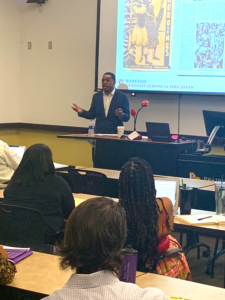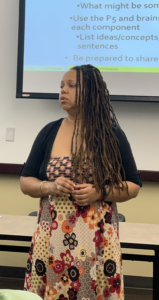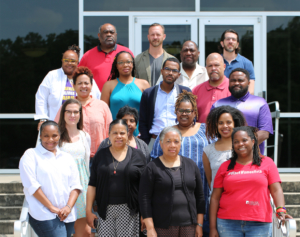The 2019 African American Studies Summer Institute was held at Prairie View A&M University from May 28-31.
Designed as an opportunity to allow faculty from throughout the College of Arts and Sciences to learn best practices for incorporating African American Studies into the curriculum, the days featured speakers in the morning and workshops in the afternoon.
“We are an intentionally black institution, which means we are training our students to be the leaders of Black America, the innovators of Black America, and the advocates of Black America,” said Melanye Price, Endowed Professor of Political Science and principal investigator for the Andrew W. Mellon Foundation African American Studies Initiative.
 Renowned speakers from Harvard, Stanford, and Rutgers spoke on their research in education of African American students across grade levels in the U.S., and throughout the African diaspora. Workshops gave faculty a chance to share methodology, while also touching on how to use university archives as teaching tools.
Renowned speakers from Harvard, Stanford, and Rutgers spoke on their research in education of African American students across grade levels in the U.S., and throughout the African diaspora. Workshops gave faculty a chance to share methodology, while also touching on how to use university archives as teaching tools.
Price emphasized the importance of infusing the curriculum with African American studies, saying “We need students not only to understand the material but understand who they are. African American studies help students understand the role that people who look like them have played in engineering, medicine, art, science, music, and every other profession.”
Jarvis R. Givens, an assistant professor in the Harvard Graduate School of Education, addressed the evolution of laws regarding education for African Americans and the role of Carter G. Woodson in creating a complementary blacks history curriculum for K-12 teacher during segregation.
Givens’s talk, “Fugitive Pedagogy”, covered the separate but unequal school systems of the Jim Crow era, and how the education system that developed from those times continues to fail Black students today.
 Selina Gray, a 1994 alum from PVAMU’s own Biology department who went on to a PhD from Stanford spoke about inequality and STEM education. She asked participants to consider whether there can be a science curriculum that also teaches students about justice. She argued that, “schools are still the frontline of the liberation struggle and the classroom is the site of disruption.”
Selina Gray, a 1994 alum from PVAMU’s own Biology department who went on to a PhD from Stanford spoke about inequality and STEM education. She asked participants to consider whether there can be a science curriculum that also teaches students about justice. She argued that, “schools are still the frontline of the liberation struggle and the classroom is the site of disruption.”
Finally, Kim Butler from Rutgers discussed the role of race and slavery in the history of carnival in Brazil. During her workshop, she talked about her expertise in engaging students with their own university archives using the work she’s done with her own students in the Rutgers archives.
Prairie View was proud to play host to such an impressive line-up of speakers and attendees, and hopes that everyone present was able to walk away with new inspiration on how to incorporate African American Studies in their classroom. We are hoping to expand and repeat the institute next year for more faculty.
Price summed up the event saying, “One of the best parts
Follow along on social media @pvamu for the latest updates on how Prairie View is changing education both here and throughout the community.

